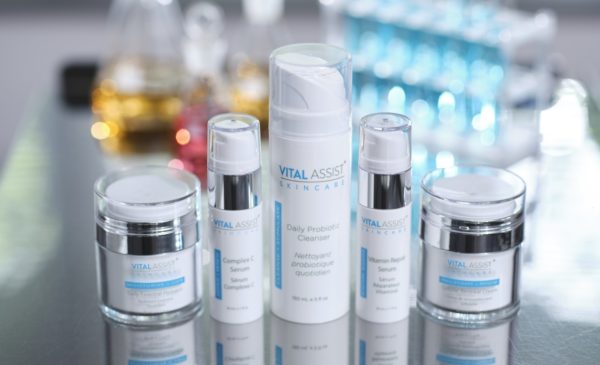How I got my glow back after four months of Chemo

Thick skin?
I’d love one. Thinning skin is one of the biggest signifiers of age thanks to UV exposure, hormones, stress, illness and - of course – actual ageing, where cells stop functioning as they once did. Having recently endured four months of chemotherapy, I can testify that illness does destroy skin.
At the end of my treatment, mine was sensitive, wrinkled, grey and as fragile looking as loo roll. Desperate for a solution, I was invited by Dr Mervyn Patterson to Woodford Medical to test a new skincare range called Vital Assist, which has been shown to actually thicken skin, as well as restoring a bit of youthful plumpness and smoothing fine lines. It had its work cut out, but after five months of use - spoiler surprise - my skin has never looked better. A lot of talk around chemo is about hair loss - but the massive number of toxic drugs used in breast cancer treatment aren’t exactly fantastic for your complexion either.
Back in October last year, my skin was reasonably fresh and unlined. I was taking collagen supplements, using systemic HRT and had regular Botox around my eyes. Now the collagen and HRT has sadly been ditched, and in pictures taken earlier this year, I look grey, hollow-eyed, and generally as though my face has caved in on itself. Yes, chemo is amazing, and it cures or prevents cancer from recurring. I am incredibly grateful to [i]be[i] ageing. But I didn’t recognise myself in the mirror. I’m certainly not alone.
‘We see a lot of patients who are desperate to restore skin condition after cancer treatment,’ says Dr Mervyn Patterson, who has brought the Vital Assist range over from the US. ‘Most people feel that they age dramatically during treatment. When you’re having chemo, the epidermis can’t hold moisture as well, so fine lines may appear. In addition, collagen and elastin, which provide healthy plumpness, break down.’
What’s more, many women’s ovaries are affected, and they are thrown into menopause. This does your complexion no favours either. In the five years post menopause you can lose as much as 30 per cent of your collagen. Several trials have shown that HRT can maintain and even boost collagen levels, but I’m off that for the moment. At the beginning of treatment, I was premenopausal (just). Now, I am firmly - say the blood tests - out the other side, with my oestrogen levels on the floor.

The Vital Assist Range is based around a retinoid. This family of ingredients is hugely popular and effective but has never worked for me as I find my skin gets very irritated and dry. The way it works is that the retinoid is delivered to the basal layer of the skin, where all the skin cells are made, and here it’s converted into retinoic acid, the active form of vitamin A, which stimulates new cell production. Too often, however, it also works on cells on the way down, triggering excess activity, causing irritation and flaking skin.
Vital Assist is a stealth retinoid. By encapsulating the retinoid in a ‘cloak’ made from protective lipids, it drops smoothly down to the basal layer. Here, an enzyme within the formulation cleaves away the lipid coating and then the skin’s enzymes convert the retinoid into active vitamin A, so it can get to work. It also contains peptides - proteins that stimulate production of collagen.
Vital Assist has just done a clinical study measuring the skin thickness of 30 people when they start using the product, after 12 weeks and after 20 weeks. It showed skin thickness almost doubled while ultrasound scans and biopsies clearly show increased collagen production. There are four products supporting the hero product - the PM Cellular Renewal Cream. There’s a Vitamin C serum which contains peptides, and what’s called arbutin, which suppresses pigment formation, and a vitamin Repair Serum to provide all the vitamins cells need. The downside is that the cream costs £120 for 50g But it has so far lasted me six months.
I’ve been using the Vital Assist range diligently since mid-February. You might argue that of course my skin has improved as it’s not being poisoned every week. I have also improved my diet so that I’m eating more protein, loads of nuts and seeds, and far more fruit and vegetables than I did before, and that will be contributing to my complexion. But the skin on my body is nothing like as good as it was pre-chemo. It is significantly more wrinkled and sagging than before, whereas that on my face is - incredibly - better. This range is targeted at anyone who is looking to boost their skin thickness, not just those who’ve been through chemo, and it’s especially good for anyone who isn’t able to take HRT and is subject to diminishing collagen. A surprising compliment that I’ve heard over the last few weeks, mostly said with barely disguised astonishment, has been ‘You look so well.’ Honestly, I’ll take that.